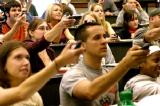About EduTech M. Sc.
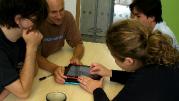 We emphasize interactive, learner-centered approaches to learning and instruction as well as dialogue and argumentation in a community of learners from around the globe. You will work on projects together with your fellow students in interdisciplinary groups, bringing in your knowledge and learning from others.
We emphasize interactive, learner-centered approaches to learning and instruction as well as dialogue and argumentation in a community of learners from around the globe. You will work on projects together with your fellow students in interdisciplinary groups, bringing in your knowledge and learning from others. Your projects will be relevant to the actual research taking place in our research group, where you can contribute to investigating computer-supported collaborative learning with the use of different technologies, from standard personal computers to interactive tabletops, to online learning platforms, tablets, and social networks. The EduTech Master offers studies for students with a bachelor’s degree in Computer Science, Education, or Psychology. From 2019 on, our previously bilingual program (English/German) is taught entirely in English.
Your projects will be relevant to the actual research taking place in our research group, where you can contribute to investigating computer-supported collaborative learning with the use of different technologies, from standard personal computers to interactive tabletops, to online learning platforms, tablets, and social networks. The EduTech Master offers studies for students with a bachelor’s degree in Computer Science, Education, or Psychology. From 2019 on, our previously bilingual program (English/German) is taught entirely in English.Overview
| University: | Saarland University; Campus C5 4, 66123 Saarbrücken |
| Degree: | Master of Science in Educational Technology |
| Program start: | Winter semester only |
| Standard period of study: | 4 semesters |
| Tuition: | The Saarland University charges a tuition fee of ca. €279 per semester (in 2020) including a pass for buses (Semesterticket). |
| Language of instruction: | English |
| Required entry qualifications: | Bachelor’s degree in Computer Science, Education, or Psychology |
| Activity types: | Course work (lectures, seminars, classes in small groups, colloquia), research projects, and a master’s thesis. |
| Internships: | An internship (max. 180 hours / 6 CP) is possible. |
| Supportive Environment: | General and academic advising is provided by the coordinator and the program’s instructors. Additional tutoring is provided for specific courses. |
| How to apply: | Online application, available in June of each year. |
| Application deadline: | Application deadline for German and international students: June 15 of each year. |
| City of Saarbruecken: | Information about Saarbrücken: www.saarbruecken.de |
| Contact: | Contact us at info@edutech.uni-saarland.de |
Concept
EduTech is interdisciplinary. It crosses and redefines the boundaries between the Learning Sciences and Computer Sciences. It bridges the theoretical and technical knowledge of computer systems with the knowledge of socio-cognitive aspects of learning to create technologies that can afford new socio-cognitive learning experiences.
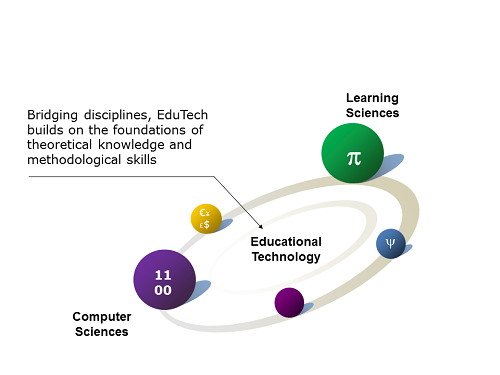
Current Research Foci
- Computer-Supported Collaborative Learning (CSCL)
- Collaboration Scripts for the Orchestration of Learning Activities
- Multi-touch Surfaces (Tablets, Interactive Tabletops)
- Learning in Web 2.0 (Facebook, YouTube, others).
- Adaptive Educational Technology, e.g. Automated Feedback in TEL
- Audience Response Systems and Social Learning Platforms for Large Lectures
- Computational Thinking
- Learning in Massive Open Online Courses (MOOCs)
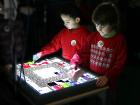
Future Perspectives
Graduates of the EduTech Master can choose, for example, a career in educational research, can become developers of digital media, can work in an e-Learning firm, can work as educational designers for specialized workplace computer courses, as creators of online educational materials, or as educational advisors for educational institutions. An alumni study of 2018 shows that more than 90% of alumni find a job within the domain of Educational Technology in the first months after graduating. Almost a third of our alumni go on to do a Ph.D. in the field.
Administrative Details
Modules and Workload
During the four semesters of the Master Program of EduTech, you will complete 120 Credit Points (CP) based on the European Credit Transfer System (ECTS). One CP is credited for a 30h workload. The program consists of compulsory and elective modules.
Detailed descriptions of the modules can be found in our new modules overview (2019) (preliminary version; might still be subject to minor changes). The old modules overview (2013 version) can be found here.
Credit Points and Exams
Please see the module catalogue (valid from 2019 on) for a summary of information on:
- the distribution of credit points to courses within one module
- the workload in terms of semester periods per week (SWS)
- whether the courses take place in the winter semester (WS) or the summer semester (SS)
- the type of exam for each of the courses/modules and
- the maximum number of credit points that can be recognized for each student in each module
For more formal information on the legal and organizational aspects of studying, you can have a look at the study regulations, the subject-specific regulations and the examination regulations provided by on the Saarland University website. To help to organize your studies, you can consult the study plan samples in the module catalog (pp. 6-8).
The old (version of 2013) modules overview, study conditions, and study plan samples documents can be found here: Modules overview (2013), study plan samples (2013).
Costs and grant opportunities
The EduTech Master is tuition-free! There is a student fee that costs around 279€/semester (in 2020) and gives you the opportunity to use public transport all over Saarland, as well as get several discounts, e.g. for cultural events.
Regarding scholarships, you can look into StudienStiftungSaar or DAAD. For more information, you may want to ask the International Office, or the Central Student Advisory Service (ZSB).
Internship
During the EduTech Master, you can do an internship for a maximum of 180 hours. This has to be approved in advance either by the faculty director of studies or by the examination board. The internship can be completed abroad. A certificate issued by the internship host (without a grade) has to be submitted as proof of the completion of the internship. The certificate must be accompanied by a report on the internship. A maximum of 6 CP (1 CP corresponds to 30 hours of internship) will be credited for the internship, which can be recognized as a free-choice course.
Study Abroad
We recommend a study abroad for all the students of the EduTech Master. The study should take place in the second or third semester of the study in a higher-education institution abroad. Students should let themselves be advised on the practical issues of the study abroad and should clarify the recognition of the studies abroad in advance (Learning Agreement). Courses and exams that were carried out abroad will be recognized only if their equivalence is clarified. Courses and exams are considered equivalent if the time and the workload associated with the content, complexity, and challenge of the courses and the exam correspond to the ones offered in the EduTech Master. This does not include one-to-one correspondence, but an overall comparison and evaluation.
The International Office and the faculty director of studies can inform you of possible study and exchange programs, grants and formal issues. Due to long application processes at universities abroad and for grants, you must typically register for a study a year before the beginning of your studies abroad. The department of EduTech maintains exchanges e.g. with the University of Oulu, Finland.
Graduation
Master’s Thesis
The master’s thesis module includes the master’s thesis and the seminar that supports students throughout working on their thesis. The aim is to help students deepen their knowledge in planning, carrying out and evaluating empirical studies. At the same time, students learn to compose a piece of scientific work formally and using appropriate scientific language within a limited amount of time. In the master’s seminar, students acquire skills in presenting and composing their master’s thesis, as well as knowledge on the specific topic of individual theses. We encourage you to start planning your Master’s Thesis early and no later than in the third semester of your studies. Please contact us for finding an interesting topic together as we issue the respective thesis’ topic.
Topic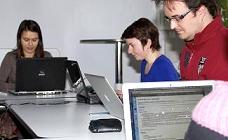 Students independently, but with adequate supervision, work on a scientific problem in the area of educational technology using standard methods in the field. The supervision will partly take place in the master’s seminar, where students present and discuss their work progress, and get feedback on methodological, formal and topic-specific issues regarding their thesis.
Students independently, but with adequate supervision, work on a scientific problem in the area of educational technology using standard methods in the field. The supervision will partly take place in the master’s seminar, where students present and discuss their work progress, and get feedback on methodological, formal and topic-specific issues regarding their thesis.
Master’s Certificate
Upon successful completion of the EduTech Master program, each graduate is awarded the degree of Master of Science (M.Sc.).
Applying and Enrolling to EduTech
Want to apply to our EduTech master’s program?
Our Applying to EduTech M.Sc. page explains the details, deadlines, and requirements for applying to our program. On the Enrolling to EduTech page, you can find information about the requirements for completing the enrollment as well as different topics to consider when moving to Saarbrücken.
Studying and Working stories from our EduTech students
A common question we receive from applicants is: “Can I work while I study?” and the answer is “Yes!”. We suggest our first semester students take it easy because the first months can be overwhelming (new city, sometimes new country, a new language, new courses, new methods, etc.), but starting from your second semester, we advise them to apply for jobs (related or not related to EduTech) so that they can start gaining some working experience in Germany. This section aims to give you some examples of our students who have decided to study and work simultaneously.Cindy Perez, Chile
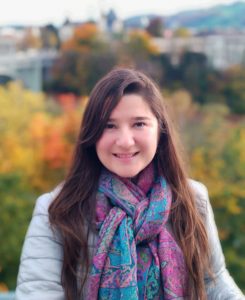
Cindy comes from Chile and after studying her bachelor in English Literature and Linguistics, followed by a Master in Translation (both in Chile), she decided to take the EduTech M. Sc. because of her interest in combining technology with education. During her studies in Saarbrücken, Cindy has worked at the VHS and at other language centers as an English and Spanish teacher. Even though she considers challenging to both study and work simultaneously, Cindy thinks it’s important to work and study because this way she can implement the technologies and learnings from our Edutech master onto her jobs. Cindy has worked as a student assistant at EduTech from her 2nd semester and as a tutor for one of our courses. While writing her thesis, she started working as a research assistant at the DIPF Institute, located at the Goethe University, Frankfurt. As for advice to current and future Edutech students, Cindy recommends planning and using your time wisely, learning how to work in teams, and preparing your Master’s thesis topic with enough time.
Nina Kukowski, Germany
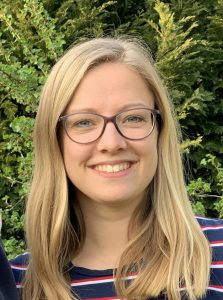
Thana Chaijeeratikul, Thailand
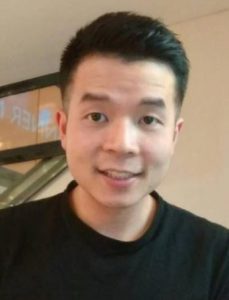
Will Pfannenstiel, United States
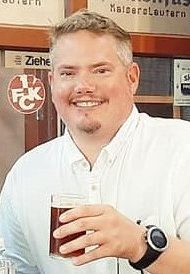 William has a Bachelor of Arts majored in History with a minor in secondary education. During his studies, William has worked as an EduTech student assistant (HiWi) and as a Tutor. He mainly helps managing EduTech wiki systems as well as creating some courses on Moodle, one of open-source learning management systems (LMS) for our Professors. He believes that no one could know all the different technology resources, but the capacity to utilize multiple resources to find reliable information is becoming one of the most important skills nowadays. Thanks to his background in Education, he could familiarize himself with the new technologies and can discuss with the users about how to improve the systems. In addition, he believes that multiculturality in his class generation gives him opportunities to improve his communication skills as well as it increases his empathy for others since people have different cultural backgrounds.
William has a Bachelor of Arts majored in History with a minor in secondary education. During his studies, William has worked as an EduTech student assistant (HiWi) and as a Tutor. He mainly helps managing EduTech wiki systems as well as creating some courses on Moodle, one of open-source learning management systems (LMS) for our Professors. He believes that no one could know all the different technology resources, but the capacity to utilize multiple resources to find reliable information is becoming one of the most important skills nowadays. Thanks to his background in Education, he could familiarize himself with the new technologies and can discuss with the users about how to improve the systems. In addition, he believes that multiculturality in his class generation gives him opportunities to improve his communication skills as well as it increases his empathy for others since people have different cultural backgrounds.Farzaneh Norouzinia, Iran
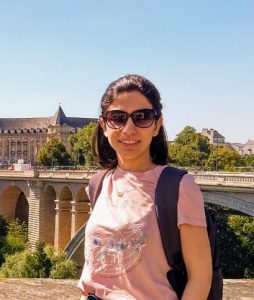 Farzaneh has a Bachelor of Arts in French literature and a Master of Arts in Teaching French. During her studies, Farzaneh has gained experience from working. Her former two jobs were not related to EduTech (cashier and office coordinator), but she had the chance to practice German and was able to find great jobs later. She has been working as a French teacher at Kern for more than 2 years and as a junior researcher at AWSi in the fields of UX and learning with Augmented Reality (AR). Despite challenges about time management, she enjoys doing her jobs because she could gather many valuable experiences.
Farzaneh has a Bachelor of Arts in French literature and a Master of Arts in Teaching French. During her studies, Farzaneh has gained experience from working. Her former two jobs were not related to EduTech (cashier and office coordinator), but she had the chance to practice German and was able to find great jobs later. She has been working as a French teacher at Kern for more than 2 years and as a junior researcher at AWSi in the fields of UX and learning with Augmented Reality (AR). Despite challenges about time management, she enjoys doing her jobs because she could gather many valuable experiences.Farzaneh gives some tips when studying in Germany. First, she states that courses at the master are important but equally essential is to take advantage of the living abroad and gather some practical experience from working. Secondly, she adds that in order to increase the chances of finding jobs in Germany, learning German should be one of your priorities. And finally, she suggests students focus on studying a specific area of EduTech and try to master it as much as possible.
Surya Prakash, India
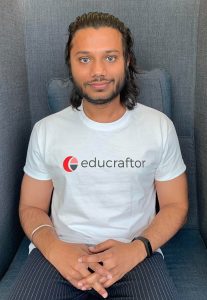 Surya is currently on a student exchange program at the University of Oulu, Finland, as our EduTech Master has an Erasmus partnership with the Master of Learning & Educational Technology Research Unit (LET). In Finland, he’s doing an internship at Educraftor – a company focused on designing and transforming learning strategies for learning and invention. He gets to learn new strategy tools, design frameworks, etc. Surya owns a bachelor’s in Electrical & Electronics Engineering, and he published his first Scientific IEEE paper when he was only 19 years old. He has entrepreneurial roots and he’s an active digital writer with his work published at Forbes, Entrepreneur. As an inventor, he always wanted to improve the efficiency of learning with exciting new technological trends and strategies. This drove him to choose our EduTech Master in Saarland. He would recommend you all to go for an exchange semester since you get to meet many students from diverse cultures, and it does help you understand the education scenario in their countries.
Surya is currently on a student exchange program at the University of Oulu, Finland, as our EduTech Master has an Erasmus partnership with the Master of Learning & Educational Technology Research Unit (LET). In Finland, he’s doing an internship at Educraftor – a company focused on designing and transforming learning strategies for learning and invention. He gets to learn new strategy tools, design frameworks, etc. Surya owns a bachelor’s in Electrical & Electronics Engineering, and he published his first Scientific IEEE paper when he was only 19 years old. He has entrepreneurial roots and he’s an active digital writer with his work published at Forbes, Entrepreneur. As an inventor, he always wanted to improve the efficiency of learning with exciting new technological trends and strategies. This drove him to choose our EduTech Master in Saarland. He would recommend you all to go for an exchange semester since you get to meet many students from diverse cultures, and it does help you understand the education scenario in their countries.

